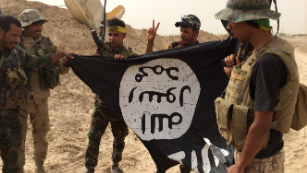Key ISIS deputy and spokesman killed in Aleppo, group says
Mohammad al-Adnani, the official spokesman of ISIS and one of its most senior members, has died in Syria, the terror group said in a rare public statement.
His death marks the highest-profile killing yet of an ISIS member. A key deputy to ISIS leader Abu Bakr al-Baghdadi, he was the person floated to be his successor should anything happen to al-Baghdadi.
A statement from ISIS' Amaq news agency on Tuesday said al-Adnani died while inspecting military operations in the area of Aleppo, Syria. ISIS has not revealed his cause of death and said it "determined to seek revenge" for the killing.
"After a journey filled with sacrifice and fight against non-believers, the Syrian Gallant knight, Abu Mohammed al-Adnani, joined the convoy of martyr leaders," ISIS said.
"To the filthy and coward nonbelievers and to the holders of the Christ emblem, we bring the good news, which will keep them awake, that a new generation in the Islamic State ... that loves death more than life ... this generation will only grow steadfast on the path to Jihad, stay determined to seek revenge and be violent toward them."
'Significant blow'
Coalition forces have not confirmed his death but the Pentagon acknowledged that he was targeted in a precision strike on Tuesday near Al-Bab, Syria.

Who was ISIS leader Muhammad al-Adnani?
"We are still assessing the results of the strike, but al-Adnani's removal from the battlefield would mark another significant blow to ISIS," Pentagon press secretary Peter Cook said in a statement.
"Al-Adnani has served as principal architect of ISIS' external operations and as ISIS' chief spokesman. He has coordinated the movement of ISIS fighters, directly encouraged lone-wolf attacks on civilians and members of the military and actively recruited new ISIS members. The U.S. military will continue to prioritize and relentlessly target ISIS leaders and external plotters in order to defend our homeland, our allies and our partners, while we continue to gather momentum in destroying ISIL's parent tumor in Iraq and Syria and combat its metastases around the world."
More than a spokesman
As spokesman, al-Adnani was the group's most prominent face, the first to announce the ISIS caliphate even before Baghdadi did.
But he was much more than a spokesman, CNN terrorism analyst Paul Cruickshank said.
Death of senior leader Adnani caps bad month for ISIS
Al-Adnani was well known for ordering operatives to attack countries participating in the US-led coalition against ISIS. Western intelligence believes he had command responsibility for the Paris attacks.
He is believed to have carried out those orders as one of the ISIS leaders overseeing its security service, known as "Amniyat," which includes the external operations unit tasked with international attacks on the West. As such, the external operations unit reported up to al-Adnani.
A number of ISIS followers and members captured and questioned in the last two years, including French jihadists Faiz Bouchrane and Reda Hame, have attested to al-Adnani as head of the Amniyat.
"In some ways he's a more dangerous figure than Abu Bakr al-Baghdadi, because he's believed to be overseeing the external operations division of ISIS, and that's the part of ISIS which threatens the West, which carried out the attacks in Paris, which could one day carry out an attack in the US on a significant scale," Cruickshank said.
READ: Ex-wife of Abu Bakr al-Baghdadi: I want a new life in Europe
First to declare ISIS caliphate
Al-Adnani has been with ISIS since its beginnings and was close to al-Baghdadi, CNN's Nic Roberston said. In June 2014, he was the first to declare a "caliphate" for parts of Syria and Iraq, indicating ISIS' aim of not just being a terrorist group but a governing entity.

Blindsided: How did ISIS grow so fast?
Born in Syria in 1977, al-Adnani was the most senior Syrian in ISIS, a trait that some analysts say may have counted against him in a leadership bid among the Iraqi-led terror group.
The US State Department officially labeled al-Adnani a terrorist in August 2014 and put a $5 million bounty on his head. They described him as "the official spokesman for and a senior leader" of ISIS, a position he obtained after becoming one of the first foreign fighters to oppose U.S.-led coalition forces in Iraq.
He was arrested in May 2005 in Al-Anbar province and is believed to have spent some time between 2005 and 2010 at the U.S. detention facility, Camp Bucca.
After his arrival in Syria, he was appointed deputy of Abu Mohammed al-Jawlani, leader of the Islamic State of Iraq for the northern province, then as the security leader before assuming a key role in external operations for ISIS, according to the United Nations Security Council.
Crush their heads with rocks
"He was the mouthpiece of ISIS. He said things like, 'If you can't shoot them, then stab them, and if you can't stab them, then crush their heads with rocks. If you can't do that then drive your cars, your vehicles, to kill them," Robertson said.
"He absolutely tried to maximize every opportunity to instill fear in Syria and Iraq and the international community and send fighters overseas to attack," Robertson said.
In May 2015, the State Department announced a reward of up to $5 million for information leading to al-Adnani, noting his "repeated calls for attacks against Westerns" and his pledges to "defeat" the United States.
He said ISIS supporters in the West had a religious duty to launch lone-wolf attacks, a move analysts call a game changer that may have inspired attacks in North America, Europe and Australia.
"He was the strategic leader of the organization, especially when it comes to attacks on the West," said journalist Graeme Wood, Edward R. Murrow Press Fellow at the Council on Foreign Relations. "To have that voice destroyed is a serious blow to the organization, probably the most significant kill that the enemies of the Islamic state have perpetrated since its declaration of the caliphate."
News Courtesy: www.cnn.com












